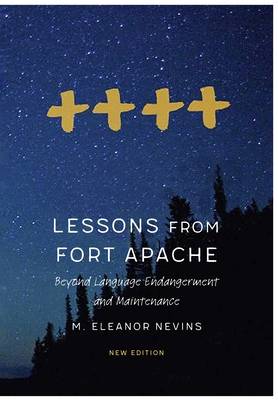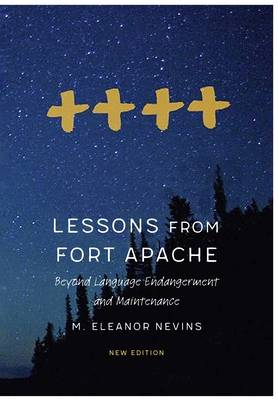
- Afhalen na 1 uur in een winkel met voorraad
- Gratis thuislevering in België vanaf € 30
- Ruim aanbod met 7 miljoen producten
- Afhalen na 1 uur in een winkel met voorraad
- Gratis thuislevering in België vanaf € 30
- Ruim aanbod met 7 miljoen producten
Lessons from Fort Apache
Beyond Language Endangerment and Maintenance
M Eleanor NevinsOmschrijving
Lessons from Fort Apache is an ethnography of Indigenous language dynamics on the Fort Apache reservation in Arizona with North American and global implications concerning language endangerment. Moving beyond a narrow focus on linguistic documentation, M. Eleanor Nevins examines how the linguistics and cultural identities of Indigenous populations are attributed with meaning against other sociocultural concerns and interests. While affirming the value of language documentation and maintenance, Nevins also provides a much-needed appraisal of the potential conflicts in authority claims and language practices between community members and the educators and scholars who research their linguistic heritage.
Nevins argues that the debates surrounding the revitalization of Indigenous languages need broadening to include larger questions of social mediation, shifting cultural identities, and the politics intrinsic to the relationship between Indigenous community members and university-accredited experts such as language researchers and educators. This engaging ethnography examines these questions and investigates the language dynamics of the Fort Apache Reservation, including the unintended challenges that standardized textual models sometimes pose to local interests. Nevins reveals the community's historical and contemporary concerns for language documentation, maintenance, and revitalization.
Lessons from Fort Apache demonstrates the need for language maintenance programs and for flexibility in finding politically sustainable forms of collaboration and exchange between researchers, teachers, and those community members who base their claims to an Indigenous language in alternate terms.
M. Eleanor Nevins is an associate professor of anthropology at Middlebury College, Vermont. She is the editor of World-Making Stories: Maidu Language and Community Renewal on a Shared California Landscape (Nebraska, 2017).
Specificaties
Betrokkenen
- Auteur(s):
- Uitgeverij:
Inhoud
- Aantal bladzijden:
- 282
- Taal:
- Engels
Eigenschappen
- Productcode (EAN):
- 9781496231468
- Verschijningsdatum:
- 1/01/2024
- Uitvoering:
- Paperback
- Formaat:
- Trade paperback (VS)
- Afmetingen:
- 178 mm x 254 mm
- Gewicht:
- 494 g

Alleen bij Standaard Boekhandel
Beoordelingen
We publiceren alleen reviews die voldoen aan de voorwaarden voor reviews. Bekijk onze voorwaarden voor reviews.












